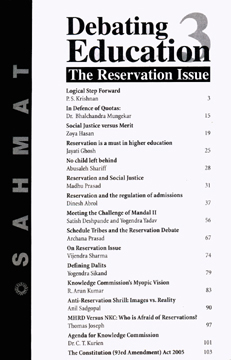RESERVATIONS to the OBCs are a must' was the unanimous opinion expressed by all the speakers in the SAHMAT convention on 'Debating Education: The Reservations Issue' held in Delhi on May 19, 2006. Professor Balchander Mungekar, member, planning commission inaugurated the daylong conevention. In his address, Mungekar stressed the need for providing reservations for the OBCs and said that it is a form of ensuring a level playing field to the depressed sections in the society. Criticising the so-called defenders of merit, he said that they in fact are condemning and stigmatising nearly 80 per cent of our population of the country comprising of SC, ST and OBCs as non-meritorious, inefficient, useless and unworthy. He termed this as an offensive of the upper caste elite on the deprived sections of the country. Terming merit as a relative phenomenon and a product of socio-material conditions, he said that in an unequal society like ours it should not be considered in a mechanical manner. He pointed out that the present opposition to reservations stems from the conflict of interests of the elite few for perpetuating their monopoly of privileges and the aspirations of the vast sections of the society. He concluded by saying that the only substitute to reservations is to create a more egalitarian social order that guarantees equal opportunities to all and called upon all to fight against all sources of inequality, exclusion and discrimination.
P S Krishnan, former secretary, backward classes commission has said that the economic system, the educational system and every institution in our country bears the stamp of the caste system and its discrimination. Thus to argue that caste should not be the basis of reservations is baseless, he said. Krishnan traced out the struggles that were waged even before our country attained independence, much before the formulation of reservation policy. He called upon the youth of today not to do or say anything that looks like the continuance of the dark legacy of discrimination and elimination on the basis of caste. Stating that the government has power to implement reservations in central educational institutes with the power it has accrued through the first constitutional amendment in 1951, he said that at least now the government should implement reservations for OBCs as it is long overdue. He recalled his association with the Mandal commission and the obstacles that were placed on the implementation of the report even from a section of biased officials. He dismissed all the arguments of anti-reservationists and even some members of the knowledge commission and urged the government to be firm in the implementation of the reservations.
Professor Prabhat Patnaik, making his remarks as the chair for the morning session criticised the role of the knowledge commission and said that a body formed by the government cannot question the unanimous decision of the parliament. He said this amounts to Constitutional impropriety and is a reason enough for asking the members to quit. He said that the Indian society is losing out by not involving the vast majority of the population in higher education. Reservations, pointed out Patnaik, is one of the important means to involve these sections in the growth and development of our country.
Professor Satish Deshpande and Yogender Yadav condemning the anti-reservation stir also proposed a new scheme of awarding social disadvantage points that permits simultaneous commitment to social justice and excellence.
Speaking at the convention Sitaram Yechury, Polit Bureau member of the CPI(M) warned against any dilution in the 27 per cent reservation for the OBCs in institutions of higher learning. He emphasised that the balance has to be maintained in the triangle of equality, quantity and quality. He said that since 27 per cent reservations for the OBCs, is only 50 per cent of their proportion in population, the creamy layer from amongst the OBCs should be kept out of the purview of reservation. Recalling the days of Mandal agitation he said that CPI(M) was the only party that had proposed the economic criteria to be applied while determining the reservations for the OBCs. 'At that time every body criticised us and we were isolated till the Supreme Court's judgement on the creamy layer had come vindicating our stand', he said. Yechury further said that the most deserving economically weaker sections among the OBCs should get the opportunities using these reservations. Some people are speaking as if reservations are not affirmative action. In fact reservations are part of affirmative action. The JNU system of awarding deprivation points to the disadvantaged sections in the society is a result of the long struggle of the students in that university, he said. Yechury also came down heavily on the knowledge commission for its myopic view of the knowledge society and its opposition to reservation for the OBCs.
Others who spoke in the afternoon session included Anil Sadgopal, Dinesh Abrol, Archana Prasad, R Arun Kumar, Yogendra Yadav and Satish Deshpande. Professor Arjun Dev presided over the session.
(INN)

BOOK

PHOTOS